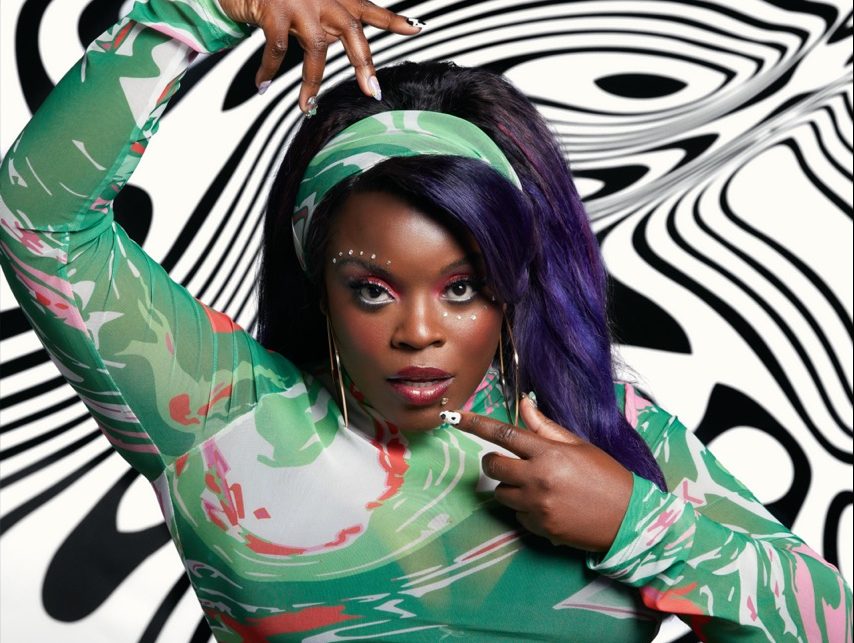She’s a six-time Grammy nominee who’s coming off a buzzy cinematic debut playing Sister Rosetta Tharpe in Baz Luhrmann’s Elvis. So why isn’t Yola, who’ll take the Jefferson Theater stage with her band on September 17, a household name?
A few answers come to mind when talking to the self-proclaimed “genre-fluid” British songstress. First, she’s difficult to brand. Genre fluidity is something some people just can’t dig. And second, she’s skeptical of the media.
“I felt like all people want to do is put you in a little box—or even in a large box,” Yola says. “But white guys can do anything. We thought they couldn’t do hip-hop. They were too far from the streets and elitist. That hasn’t stopped them.”
Household name or not, Yola can sing. And play guitar. And write music. Oh, and she’s an avid student of the human brain.
After her breakout first album, the four-time Grammy-nominated Walk Through Fire, Yola hit a creative dry spell. Her solution? Go deep into her own songwriting process and turn it on its head. “I managed to kind of deconstruct the way I create on a scientific level,” she says. “I am aggressively sciency.”
Yola’d been curious about the brain and its relationship to singing and songwriting since battling vocal nodules early in her career. After struggling with average medical care and vocal coaching during her recovery, she decided to learn exactly what was happening to her. Applying a similarly scientific approach to songwriting was only natural when she had to overcome writer’s block for her second LP, Stand for Myself.
Yola breaks it down like this: Many of the songs she wrote for her first record came from her prefrontal cortex, the part of the brain that does all the consciously clever stuff. But on a few songs, she figures she was able to draw from her midbrain, which is responsible for the senses. Those midbrain songs express ideas that spring to mind and “bump together” without help from the clever prefrontal cortex, and they’re more inspired.
“The idea of using that part of the brain that holds everything we have ever sensed and creates this ‘soup’—that’s the thing that allows you to make more elegant connections,” Yola says.
Using that part of the brain is easier said than done. But Yola, like so many of us, had a lot of time to putter around the house and try things over the past couple years. One strategy that worked consistently was watching meditative television—track and field, Formula One racing (she’s a “massive fan”), or the Tour de France—into the early hours of the morning.
Sitting in her living room or idly performing household tasks with burst-of-activity sports playing in the background, Yola was able to enter a less cognitive state, ignoring basic motor functions and focusing on her midbrain soup. The process yielded at least a third of the tracks on Stand for Myself, Yola’s first album to debut on the Billboard 200 (at 196). Another third came from ideas that had been in her head for years, and for the final third, she credits her producer and collaborator, Black Keys frontman Dan Auerbach, for taking them to the next level.
“Foundationally, Dan and I are both music fans,” she says. “He was able to imagine me doing feasibly anything, and that was also important for me to realize: I can feasibly do anything.”
At this point in her career, Yola refuses to be tied to a genre or put in a box, but she also has a well-defined mission ahead of her. After playing Sister Rosetta in Elvis, she’s considering more acting gigs and has been in talks with producers. But any role would have to be on her own terms.
“I am going to see what speaks to me,” she says. “If I play someone, that character is going to be nontoxic to Black women. That is the brand.”
When it comes to music, “it’s about reclaiming everything that has been stolen from Black people,” she says. She doesn’t want to see what happened to Sister Rosetta Tharpe, who had her role in inventing rock music scrubbed from the history books, happen to other marginalized people.
“The machine that we live in has constantly tried to program you against the efforts we’re making to be better. It is an attack on our brains,” Yola says. “Once we realize we didn’t come out of the womb like this, we can say, ‘Okay I have just got to stop these things from attacking my brain and know exactly what we are consuming.’”
Yola says her two genre-fluid records to this point have been building blocks, bridges to something even bigger. Now that she’s showcased her abilities in multiple genres, she’s free to focus on one if she chooses, maybe with a blues record here or a disco album there.
For now, though, she and her band will bring big shows to her fans, even as she plays smaller venues like the Jefferson between festival junkets and major-city headline spots.
“Everywhere we go, we still bring the same bus with the same trailer,” Yola says. “One thing that is maybe different from a festival set is I like to strip everything back on a few songs and show people an original version from before I took it to anybody else. I like to give people that.”






